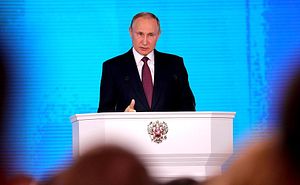Russia conducted a partially successful test of its developmental nuclear-powered cruise missile, the Burevestnik, on January 29, 2019, according to U.S. government sources with knowledge of Russia’s weapons programs who spoke to the The Diplomat. The test took place at Russia’s Kapustin Yar missile test range and is the thirteenth to date involving the missile.
The test marks the first involving the Burevestnik in nearly one year. The missile had not been tested since February 2018. According to one source, U.S. intelligence assesses that Russia’s development efforts on the missile continues. The United States intelligence community internally calls the missile the KY30 or the SSC-X-9 SKYFALL.
The Burevestnik was first tested at Kapustin Yar in June 2016. According to U.S. military intelligence, only one test of the missile has been moderately successful to date. That test took place in November 2017 from Russia’s Pank’ovo test site in Novaya Zemlya and resulted in recovery mission involving specialized Russian ship crews to retrieve the missile’s debris and nuclear materials from the Barents Sea after a crash.
In a speech unveiling a suite of new missile systems before the Russian Federal Assembly in March 2018, Russian President Vladimir Putin noted that “In late 2017, Russia successfully launched its latest nuclear-powered missile at the Central training ground.”
He continued that “during its flight, the nuclear-powered engine reached its design capacity and provided the necessary propulsion.” He additionally claimed that the missile’s range was “unlimited” and that it could “maneuver for as long as necessary.”
No country has to date deployed a cruise missile using an on-board nuclear reactor, largely given the engineering challenges and safety concerns involved. In the late-1950s, the United States began development on prototype nuclear-powered ramjet engines as part of Project Pluto, but none of those missiles were ever deployed.
The Burevestnik was announced by Putin alongside a range of new nuclear weapons in his March 2018 address. Some of the other weapons include the Avangard, a hypersonic boost-glide reentry vehicle, the Poseidon, an autonomous thermonuclear torpedo, the Sarmat, a new intercontinental-range ballistic missile, and the Kinzhal, an air-launched ballistic missile.
The January test of the Burevestnik comes shortly after the release of the United States’ 2019 Missile Defense Review, which called for the development of a range of new technologies to augment existing U.S. defensive capabilities against cruise and ballistic missile threats. In March 2018, Putin justified Russia’s development of the Burevestnik and other new systems in terms of growing Russian concerns about U.S. missile defense capabilities.

































